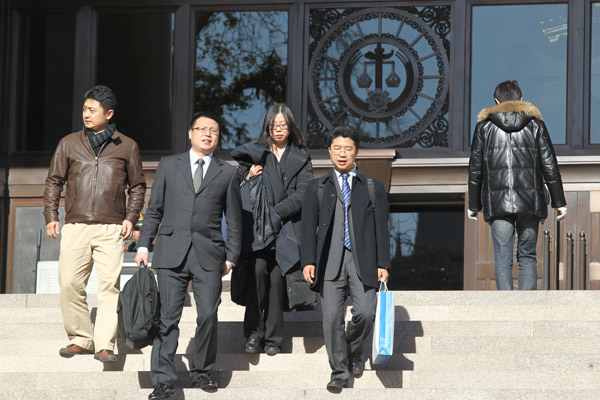First web monopoly case opened
Updated: 2013-11-27 00:26
By AN BAIJIE and GAO YUAN (China Daily)
|
|||||||||||
 |
|
Lawyers representing Qihoo 360 Technology Co leave the Supreme People's Court on Tuesday at noon after court adjourned. The court opened the trial against Tencent Inc, which is accused by Qihoo of "abusing its dominant position in the market". ZHU XINGXIN / CHINA DAILY |
The Supreme People's Court heard the country's first Internet anti-monopoly case on Tuesday in which Qihoo 360 Technology Co, a leading antivirus software developer, accused China's Internet giant Tencent Inc of "abusing its dominant market position".
The top court has not heard antitrust cases involving Internet companies since China's Anti-Monopoly Law was enacted on Aug 1, 2008.
This is Qihoo's second lawsuit against Tencent. On March 28, the Guangdong High People's Court ruled that Tencent was not in violation of the Anti-Monopoly Law and rejected Qihoo 360's monopoly claims.
| TIMELINE |
|
Fights sprawl from cyberspace to court •February 2010 Tencent Inc publishes a new Internet security software called QQ Doctor and incorporates it into Tencent PC Manager, a product similar to 360 PC Manager by Qihoo 360 Technology Co, a competitor. •Sept 27, 2010 Qihoo launches a new software called 360 Privacy Protector to monitor Tencent’s QQ, which Qihoo said “infringes on users’ privacy”. •Sept 28, 2010 Tencent publishes an article claiming that Qihoo used a pornographic website to promote its product. Police subsequently launch an investigation. •Oct 14, 2010 Tencent says it will sue Qihoo for unfair competition because 360 Privacy Protector “misled and cheated users”. •Oct 27, 2010 Baidu Inc and Tencent call on the IT industry not to cooperate with Qihoo. •Oct 29, 2010 Qihoo launches a new product called 360 Koukou Protector, which Tencent said “dysfunctions many modules of QQ”. •Nov 3, 2010 Tencent declares it will stop QQ from running in computers with Qihoo 360 software installed. •Nov 4, 2010 Qihoo says it will stop running its Privacy Protector. •Nov 21, 2010 The Ministry of Industry and Information Technology circulates a notice criticizing Tencent and Qihoo. The two companies apologize and restore software compatibility to each companies’ products. •Nov 24, 2010 Qihoo sues Tencent for maligning its reputation. •April 2012 Qihoo files an antitrust complaint in Guangdong High People’s Court. •March 2013 The court rules that the accusation that Tencent “abused its dominating place in the market” had not been established. Qihoo then appeals to the Supreme People’s Court. •Nov 26, 2013 The Supreme People’s Court hears the case. - Hou Liqiang |
During Tuesday's trial, attorneys for Qihoo 360 claimed the first trial was held unfairly and that the top court should reject the March 28 verdict.
Qihoo 360 claims it has lost 825 million yuan ($135 million) because of Tencent's abuse of its dominant market position. It is seeking 150 million yuan in compensation.
Qihoo 360 claims Tencent has a nearly 90-percent share in the domestic instant messaging service market and also said none of Tencent's competitors have more than a 5-percent market share.
Tencent countered by saying that Qihoo 360 lacks the evidence to support its claims. It said the 90-percent market share is not based on commercial revenues but the length of time users spend on Tencent's instant messaging service.
Qihoo 360 claims Tencent also abused its dominant position by forcing users to choose between the two companies' services. It points to Tencent's announcement on Nov 3, 2010, that it would shut down its QQ instant messaging service on computers that had installed security software by Qihoo 360.
Tencent said it was protecting the users' legal rights.
Both companies apologized to Internet users after being ordered by the Ministry of Industry and Information Technology to stop their bickering.
The relationship between the two companies soured after September 2010, when Qihoo 360 accused Tencent of invading its users' privacy through the use of QQ Doctor, a security program developed by Tencent and incorporated into the QQ instant messaging service.
In October 2011, Qihoo 360 sued Tencent for anti-monopoly law violations. It also sought 150 million yuan in compensation from Tencent.
The lawsuit dragged on for nearly a year before the Guangdong High People's Court began court proceedings on April 18, 2012. The court attempted to mediate a settlement between the two but failed, Xinhua News Agency said.
Xue Zhaofeng, a professor of the Law School at Peking University, said a monopoly is based on three points: Whether the enterprise is blocking its competitors; the existence of government intervention; and whether restrictions on companies interested in entering a market are low.
"China's Internet market is highly competitive and does not possess these features," said Xue.
As every Internet company is looking for ways to expand in the market, an overlapping of services is inevitable, said Dong Xu, an analyst at Beijing-based research company Analysys International. He said Qihoo's long-standing fight with Tencent and Baidu Inc points to competitive fighting in the industry.
"Online searching is an important asset for Qihoo because it is the entry for major Internet functions, including video, social networking and online shopping," Dong said.
Contact the writers at anbaijie@chinadaily.com.cn and gaoyuan@chinadaily.com.cn
Related Stories
High court to broadcast monopoly trial online 2013-11-26 10:43
Baidu sued amid claims of video copyright violation 2013-11-14 10:07
Sogou sues Qihoo 360 over dirty tricks 2013-09-26 09:55
New war of words as Zhou enters market 2013-07-01 08:02
Tencent wins third suit against Qihoo 360 2013-04-26 10:43
Today's Top News
Economist calls for market-driven urbanization
China to expand trade with CEE countries
China, Romania seal railway deals
Cameron visit a chance to boost ties
Investment rules eased under reform
Aircraft carrier begins training
TMT attracting more investors, PwC says
Nuclear power 'to fall short of demand'
Hot Topics
Lunar probe , China growth forecasts, Emission rules get tougher, China seen through 'colored lens', International board,
Editor's Picks

|

|

|

|

|

|





